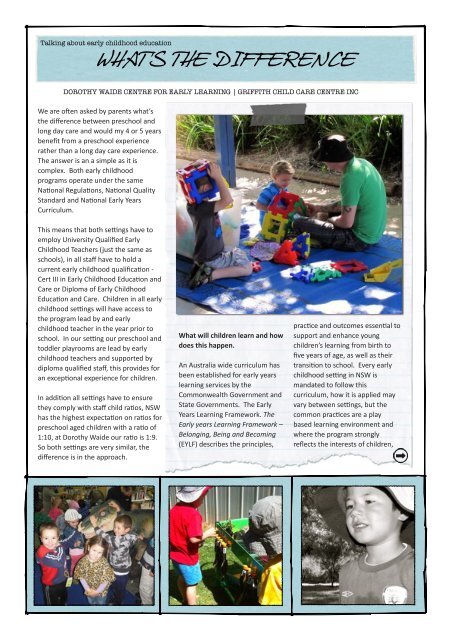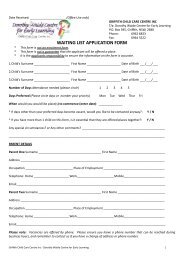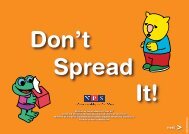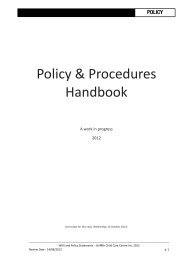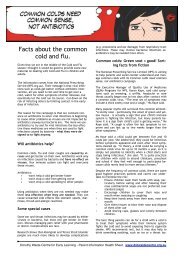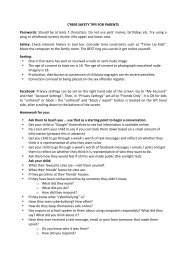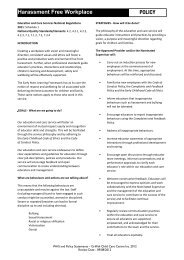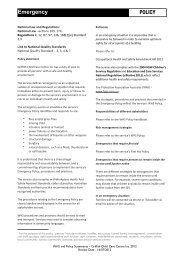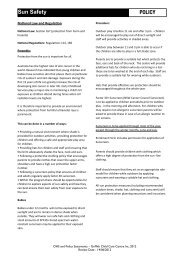resource - Dorothy Waide Centre for Early Learning
resource - Dorothy Waide Centre for Early Learning
resource - Dorothy Waide Centre for Early Learning
Create successful ePaper yourself
Turn your PDF publications into a flip-book with our unique Google optimized e-Paper software.
Talking about early childhood education<br />
WHAT’S THE DIFFERENCE<br />
DOROTHY WAIDE CENTRE FOR EARLY LEARNING | GRIFFITH CHILD CARE CENTRE INC<br />
We are o'en asked by parents what’s <br />
the difference between preschool and <br />
long day care and would my 4 or 5 years <br />
benefit from a preschool experience <br />
rather than a long day care experience. <br />
The answer is an a simple as it is <br />
complex. Both early childhood <br />
programs operate under the same <br />
NaConal RegulaCons, NaConal Quality <br />
Standard and NaConal <strong>Early</strong> Years <br />
Curriculum.<br />
This means that both seKngs have to <br />
employ University Qualified <strong>Early</strong> <br />
Childhood Teachers (just the same as <br />
schools), in all staff have to hold a <br />
current early childhood qualificaCon -‐ <br />
Cert III in <strong>Early</strong> Childhood EducaCon and <br />
Care or Diploma of <strong>Early</strong> Childhood <br />
EducaCon and Care. Children in all early <br />
childhood seKngs will have access to <br />
the program lead by and early <br />
childhood teacher in the year prior to <br />
school. In our seKng our preschool and <br />
toddler playrooms are lead by early <br />
childhood teachers and supported by <br />
diploma qualified staff, this provides <strong>for</strong> <br />
an excepConal experience <strong>for</strong> children.<br />
In addiCon all seKngs have to ensure <br />
they comply with staff child raCos, NSW <br />
has the highest expectaCon on raCos <strong>for</strong> <br />
preschool aged children with a raCo of <br />
1:10, at <strong>Dorothy</strong> <strong>Waide</strong> our raCo is 1:9. <br />
So both seKngs are very similar, the <br />
difference is in the approach.<br />
What will children learn and how <br />
does this happen.<br />
An Australia wide curriculum has <br />
been established <strong>for</strong> early years <br />
learning services by the <br />
Commonwealth Government and <br />
State Governments. The <strong>Early</strong> <br />
Years <strong>Learning</strong> Framework. The <br />
<strong>Early</strong> years <strong>Learning</strong> Framework – <br />
Belonging, Being and Becoming <br />
(EYLF) describes the principles, <br />
pracCce and outcomes essenCal to <br />
support and enhance young <br />
children’s learning from birth to <br />
five years of age, as well as their <br />
transiCon to school. Every early <br />
childhood seKng in NSW is <br />
mandated to follow this <br />
curriculum, how it is applied may <br />
vary between seKngs, but the <br />
common pracCces are a play <br />
based learning environment and <br />
where the program strongly <br />
reflects the interests of children,
One isn't necessarily born with courage, but one is born with potential. Without courage, we<br />
cannot practice any other virtue with consistency. We can't be kind, true, merciful, generous, or<br />
honest. -Maya Angelou<br />
families, adults and community.<br />
The Framework has a strong emphasis <br />
on play-‐based learning as play is the <br />
best vehicle <strong>for</strong> young children’s <br />
learning providing the most <br />
appropriate sCmulus <strong>for</strong> brain <br />
development. The Framework also <br />
recognises the importance of <br />
communicaCon and language <br />
(including early literacy and numeracy) <br />
and social and emoConal <br />
development.<br />
Some of the features of a quality early <br />
childhood program will be focus on <br />
play and how children learn through <br />
deep engagement in what they are <br />
doing and adults engaging with <br />
children through this process. You will <br />
big blocks of Cme devoted to children’s <br />
play, allowing children to fully explore <br />
what they are doing. <br />
The EYLF has a five key learning <br />
outcomes that are addressed within <br />
the curriculum. These learning <br />
outcomes are essenCal <strong>for</strong> a child to <br />
succeed through life, and enhance <br />
their success as a they start school. <br />
The learning outcomes are expressed <br />
as ..<br />
• Children have a strong sense of <br />
idenCty (knowing who you are, <br />
who you belong to and how you <br />
fit in the world)<br />
• Children are connected with and <br />
contribute to their world (being <br />
able to parCcipate in play with <br />
others, contribute to curriculum, <br />
play, tell news, etc)<br />
• Children have a strong sense of <br />
wellbeing (feeling good about <br />
yourself, happy and engaged)<br />
• Children are confident and <br />
involved learners (knowing and <br />
wanCng to learn about how the <br />
word works, developing <br />
conceptual knowledge, literacy, <br />
numeracy, interest in science, <br />
creaCve processes)<br />
• Children are effecCve <br />
communicators. (being able to <br />
tell their story, through talking, <br />
listening, drawing, developing <br />
wriCng skills, using technology <br />
etc)<br />
For more in<strong>for</strong>maCon see <strong>Early</strong> years <br />
learning framework (PDF – 170kb).<br />
What will this learning look like?<br />
Lots of opportunity <strong>for</strong> children to <br />
engage in meaningful, planned <strong>for</strong> play. <br />
Within our curriculum programing we <br />
intenConally plan <strong>for</strong> play and acCvely <br />
create opportuniCes <strong>for</strong> children to <br />
engage and explore play that leads <br />
them to discoveries, news skills, and <br />
new ways of thinking. <br />
Our planning model incorporates what <br />
children are interested. This is <br />
determined by group brain storming <br />
sessions with children where children <br />
bring their topic of interest and we <br />
explore with what they know and what <br />
they want to learn about. This means <br />
that they are engaged from the start in <br />
the learning process and how we plan <br />
<strong>for</strong> that. This allows us then to build in <br />
the conceptual knowledge and skills <br />
we know children need to have success <br />
in life. Literacy, numeracy, life skills, <br />
social skills, science, and creaCvity are <br />
all included and this is constantly <br />
assessed against the framework and <br />
developmental milestones, to ensure <br />
that children are within the <br />
developmental level <strong>for</strong> their age <br />
group.<br />
You will observe children pracCcing <br />
their wriCng skills in the wriCng area, <br />
counCng with games and puzzles, <br />
being creaCve with cra', art, blocks <br />
and sand play. You will see children <br />
playing together, negoCaCng to share <br />
equipment, share ideas on how to <br />
build projects, playing games, <br />
remembering rules and being <br />
confident to talk in groups and with <br />
adults.<br />
Some things you won’t see in our play <br />
are stencils, these are not appropriate <br />
<strong>for</strong> young children and sCfle creaCvity <br />
and thinking. You wont see children <br />
siKng at tables doing <strong>for</strong>mal lessons <br />
on number or the alphabet. This is <br />
what school does and is best le' to <br />
when children are older, children learn <br />
in a far more organic way. You also <br />
won;t find us working on the leeer of <br />
the week, colour of the week or other <br />
themaCc approaches to teaching, <br />
these approaches are not seen as <br />
effecCve ways to engage children and <br />
are more <strong>for</strong> adults than children.<br />
Our creaCve acCviCes are also very <br />
much child directed, so you won’t find <br />
all children coming home with the <br />
same completed cra' or art work. <br />
Again this is an appropriate way to <br />
work with children or to engage with <br />
their learning. Enabling children to <br />
find their own voice with creaCvity <br />
enables them to find out what they <br />
know and how they see the world, <br />
leKng them come up with how they <br />
express that ensures that we cater to <br />
how they learn. Howard Gardener, <br />
educaConal specialist, idenCfied that <br />
we all learn in very different ways -‐ <br />
some by doing, some by listening, <br />
some think in logical ways, some <br />
musical, some through movement. <br />
SomeCmes its combinaCons of these <br />
different learning styles. Our job as <br />
educators is to facilitate each child's <br />
learning style to get the best out of <br />
them. <br />
You will see how we noCce children in <br />
how we write up the daily journal <br />
(program), how we complete children’s <br />
learning stories (a narraCve of a child’s <br />
play) how we unpack the learning and <br />
knowledge we can see against the <br />
learning outcomes and what this <br />
means <strong>for</strong> that child as they grow and <br />
in how we communicate with you
about your child.<br />
Our Rou8ne:<br />
Our day has big blocks of Cme <strong>for</strong> <br />
children to engage with what they <br />
are interested in. <br />
Our morning starts off inside, <br />
greeCng each other, seeling into our <br />
day in a relaxed and in<strong>for</strong>mal way. <br />
OpportuniCes to read books, snuggle <br />
up and catch up. As our group grows <br />
we move to our home playrooms and <br />
gather to plan our day and what we <br />
might be doing. We then grab our <br />
hats and sunscreen and head outside. <br />
Children help set up, one of the life <br />
skills that is so important -‐ children <br />
needing to able to plan <strong>for</strong> their play <br />
and take an acCve role in doing it. <br />
Outside you will find children playing <br />
games with adults, pracCcing skills <br />
like riding bikes, jumping, running, <br />
balls skills, in the sand pit making <br />
cakes, building roads -‐ measuring, <br />
counCng, being creaCve. You will also <br />
find children in the vege garden <br />
checking the veges, measuring growth, <br />
checking on the composCng process <br />
and looking <strong>for</strong> bugs. All part of <br />
connecCng with the natural world. We <br />
also do cra' and art outdoors, so <br />
acCviCes you will find indoors are also <br />
available in the outdoor space too.<br />
We are back indoors at about 10:30 <br />
ensuring we comply with best pracCce <br />
<strong>for</strong> sun safety. Its back to a small <br />
regrouping and re-‐engaging -‐ what are <br />
we going to do, who with and when. <br />
Then back to play.<br />
Puzzles, construcCons acCviCes games, <br />
books, role play, creaCve arts, and <br />
technology o'en all being done in <br />
small groups, with educators mixing <br />
with all children. You will see <br />
educators and children searching the <br />
internet <strong>for</strong> new knowledge, checking <br />
youtube clips of sharks or dinosaurs or <br />
fairy princesses. <br />
Children sharing their thinking with the <br />
group is also important and while large <br />
group experiences are kept really short <br />
these are sCll important <br />
moments <strong>for</strong> children to <br />
gain confidence. Most of our group <br />
experiences are in small groups. <br />
Why is play so important?<br />
Play is very important <strong>for</strong> children.<br />
Through play young children explore <br />
and learn to understand the world <br />
around them as they come to <br />
communicate, discover, imagine and <br />
create.<br />
When children play they are showing <br />
what they have learned and what they <br />
are trying to understand. This is why <br />
play is one of the foundaCons of the <br />
<strong>Early</strong> Years <strong>Learning</strong> Framework. A <br />
play-‐based program does not mean <br />
that children just do what they like all <br />
day. In a play-‐based program there will <br />
be Cmes when children come together <br />
as a group, listen when others are <br />
talking, follow the rules of group living <br />
and begin to take responsibility <strong>for</strong> <br />
their acCons and their environment.<br />
Children are offered choices that <br />
reflect their developmental stage. The <br />
choices are determined by the <br />
educators <br />
and are provided within limits of safety <br />
and within the group seKng. The <br />
educators conCnually evaluate <br />
children’s play to discover what it is <br />
children are learning and to then help <br />
shape and extend this learning.<br />
Will preschool at <strong>Dorothy</strong> <strong>Waide</strong> help <br />
my child be ready <strong>for</strong> school?<br />
Yes. <strong>Early</strong> childhood centres’ help <br />
children to become socially and <br />
developmentally prepared to transiCon <br />
to school. We work with children at <br />
levels that are appropriate to their age, <br />
and enable children to develop and <br />
learn, gaining social competency and <br />
skills.<br />
Being ready <strong>for</strong> school is about being <br />
EmoConally and Socially ready <strong>for</strong> <br />
school. Being confident to engage with <br />
others, confident to take part, <br />
confident to separate from parents. <br />
EnthusiasCc about learning. While <br />
conceptual knowledge can be a bonus, <br />
children don’t need to know the <br />
alphabet back to front or be able to <br />
count to 100 to start school. What
we know is that if your well being is <br />
catered <strong>for</strong> and you are happy <strong>for</strong> <br />
much of the Cme then your prospects <br />
<strong>for</strong> learning are much beeer off. <br />
School will build on the skills they have <br />
gained in the early years.<br />
If you are sCll thinking about whether <br />
to send your child to school, our <br />
educator team can help. Just arrange a <br />
Cme to sit and talk about how you <br />
child is progressing and if they are <br />
ready <strong>for</strong> school.<br />
Cost:<br />
Standalone preschools and Long Day <br />
Care services are funded very <br />
differently, and parents have access to <br />
different levels of support. This means <br />
that fees can vary significantly between <br />
the two types of services. Preschools <br />
currently can not access Child Care <br />
Benefit, so this means that <strong>for</strong> some <br />
parents the fee at long day care <strong>for</strong> <br />
preschool once CCB is applied can be <br />
below the preschool fee at a stand <br />
alone seKng. For some families the <br />
fee at preschool may be below the <br />
level of support they can access at a <br />
long day care seKng.<br />
So whats the difference between <br />
preschool and long day care then?<br />
The big differences are length of the <br />
day and the age mix of the children. <br />
We are open from 7am through Cll <br />
6pm, so if <br />
you are working you have the flexibility <br />
of start and finish of your day without <br />
having to sort out other care <br />
arrangements <strong>for</strong> your child. You also <br />
have the flexibility of more days, <br />
Preschool can someCmes be limited in <br />
the number of days and hours you can <br />
receive fee support <strong>for</strong>.<br />
<strong>Dorothy</strong> <strong>Waide</strong> is also open <strong>for</strong> 49 <br />
weeks of the year as well, closing only <br />
<strong>for</strong> Christmas and <strong>for</strong> a few days <br />
around Easter each year. <br />
Long day care means that we also cater <br />
<strong>for</strong> children from birth through to <br />
school age. We are mulC-‐aged group, <br />
one of the most effecCve ways to <br />
group children and <strong>for</strong> them to learn <br />
and engage with their peers and <br />
others. The grouping means that <br />
children will mix with children who are <br />
younger and older than them. This <br />
builds on children’s confidence, <br />
empathy and also skills. Younger <br />
children <br />
learning off <br />
older children is <br />
one of the best <br />
ways to get new <br />
skills, and much <br />
less frustraCng. <br />
The grouping also <br />
reflects the <br />
broader world we <br />
live in which is filled <br />
with people older <br />
and younger than <br />
us. At <strong>Dorothy</strong> <strong>Waide</strong> <br />
our preschool room <br />
has a mix of ages from 3 -‐ school age. <br />
Each year we have around 34 children <br />
who move on to “big School”, each day <br />
thus means around 10 -‐ 14 children will <br />
be in their prior to school year. Many <br />
of these children aeend mulCple days. <br />
This cohort is very strong, engaged and <br />
acCve young learners, the small group <br />
size also means that the educator team <br />
are beeer able to cater <strong>for</strong> their <br />
individual needs.<br />
So what if I “mix and match” <br />
preschool and long day care <br />
“preschool”. <br />
Not a problem at all, as the parent you <br />
will make the best decision <strong>for</strong> your <br />
child. SomeCmes we benefit from <br />
having a mix of care arrangements, <br />
someCmes this can be overwhelming <br />
<strong>for</strong> children. In the same way that <br />
adults get overwhelmed by too many <br />
things happening in their life. But <br />
neither preschool in a standalone <br />
service or preschool in a long day care <br />
environment is beeer than the other, <br />
its just different. <br />
Our aim should be what is the best <br />
experience <strong>for</strong> my child, which offers <br />
the best opportuniCes.<br />
If you have quesCons or want to know <br />
more about what we do please talk to <br />
the educator team -‐ Grace, Glenn, <br />
Laura, or Neville


